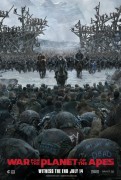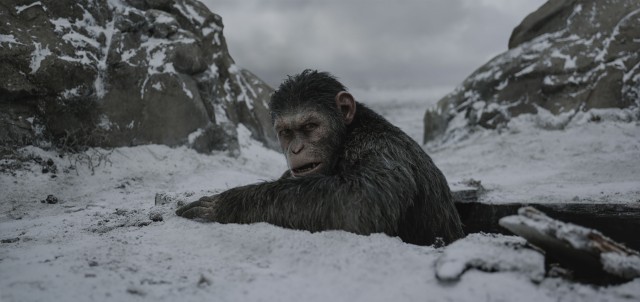War for the Planet of the Apes Movie Review
 |
War for the Planet of the Apes
Theatrical Release: July 14, 2017 / Running Time: 142 Minutes / Rating: PG-13 Director: Matt Reeves / Writers: Mark Bomback, Matt Reeves (screenplay); Pierre Boulle (novel); Rick Jaffa, Amanda Silver (characters) Cast: Andy Serkis (Caesar), Woody Harrelson (Colonel J. Wesley McCullough), Steve Zahn (Bad Ape), Terry Notary (Rocket), Amiah Miller (Nova), Toby Kebbell (Koba), Karin Konoval (Maurice), Gabriel Chavarria (Preacher) |
In a good way, I can think of nothing in Hollywood that makes as little sense as the Planet of the Apes franchise. When 20th Century Fox decided to reboot things with 2011's Rise of the Planet of the Apes, It wasn't like Fox was looking at the franchises that were making money as a template. Rise bore little resemblance to Transformers, Harry Potter, or Marvel's superhero movies. For that matter, it bore little resemblance to the iconic original film starring Charlton Heston. Instead, Rise was an original and compelling reboot prequel, distinguished but not defined by state-of-the-art visuals. It felt like a really well-made standalone attraction, not the foundation of a new saga. Time has proven it to be the latter, after 2014's Dawn of the Planet of the Apes advanced the storyline in a different direction in remarkably satisfying fashion.
Three summers later, the franchise is extended with War for the Planet of the Apes, another distinctive and remarkable chapter in a series that artistically is several notches above every other recently active, multi-film, live-action tentpole franchise. Like Dawn, War does away with human cast members and focuses on the apes who evolved intellectually in tandem with a virus that wiped out most of the human race. Ever since the ape Koba went on the attack, mankind and apes have been feuding. Ape protagonist Caesar (yet again stunningly conveyed by animators and Andy Serkis motion capture) has been hiding in the forest. After the previous two films are synopsized in single sentences, we're thrown into the human army pursuing the apes, complete with a couple of ape traitors (called "Donkeys") on their side.
Despite its title, this threequel is no more of a war movie than its predecessor was. Like fellow 2017 tentpole Kong: Skull Island, War does draw major inspiration from Francis Ford Coppola's Apocalypse Now. By the time graffiti saying "Ape-pocalypse Now" is seen on stone, Caesar's company on this mission include his wise orangutan advisor Maurice (Karin Konoval), a silent young human girl orphaned in the war (Amiah Miller), and Bad Ape (Steve Zahn), a loopy new English-speaking ape who is the lone survivor of a zoo (and the closest this dark movie has to tasteful comic relief). They travel through mountains and snow, with Caesar eventually getting separated from the gang and imprisoned in the work camp where the human military is detaining apes. Caesar and the Colonel have their own Willard-Kurtz exchanges, although theirs are better lit and less haunting and poetic. (It's worth mentioning that, much like Corey Hart, the Colonel wears his sunglasses at night.) Caesar is also enforced as a Christlike figure, whom other apes look to for hope while the Colonel has him pushed to his limit and strung up on a diagonal cross.
Consistently exciting, riveting, and bold, War is an epic adventure, a prison escape movie, and an agreeable finale to a trilogy that is so much more thought-provoking and moving than you expect summer popcorn movies to be. This decade's three Apes films have increasingly redefined what it means to be a summer popcorn movie, relying extensively on completely digital animal characters and asking viewers to be okay with subtitled sign language. Dawn was a significantly bigger hit than Rise while pushing the envelope even more and downgrading human star power. Can War go even further and push this to the billion dollar worldwide club typically reserved for superhero-laden action flicks, Star Wars, and four-quadrant family films? Probably not. But the fact that these films can find that rare blend of critical and commercial success speaks volumes for both those making the films and those buying in. I considered Dawn the best film of its year for nearly all of 2014 and halfway through 2017, War is definitely in consideration for this year's crown.
|
Related Reviews:
DVDizzy.com | DVD and Blu-ray Reviews | New and Upcoming DVD & Blu-ray Schedule | Upcoming Cover Art | Search This Site
DVDizzy.com Top Stories:
Rise of the Planet of the Apes • Dawn of the Planet of the Apes
Directed by Matt Reeves: Let Me In • Cloverfield • Felicity: Season 4
Now in Theaters: Wonder Woman • Baby Driver • Guardians of the Galaxy Vol. 2 • The Mummy
Woody Harrelson: The Hunger Games: 4-Film Collection • The Edge of Seventeen • Defendor • Now You See Me • Zombieland
Kong: Skull Island • Star Wars: The Force Awakens • Logan • Apocalypse Now
Text copyright 2017 DVDizzy.com. Images copyright 2017 20th Century Fox, Dune Entertainment, and Chernin Entertainment.
Unauthorized reproduction prohibited.

